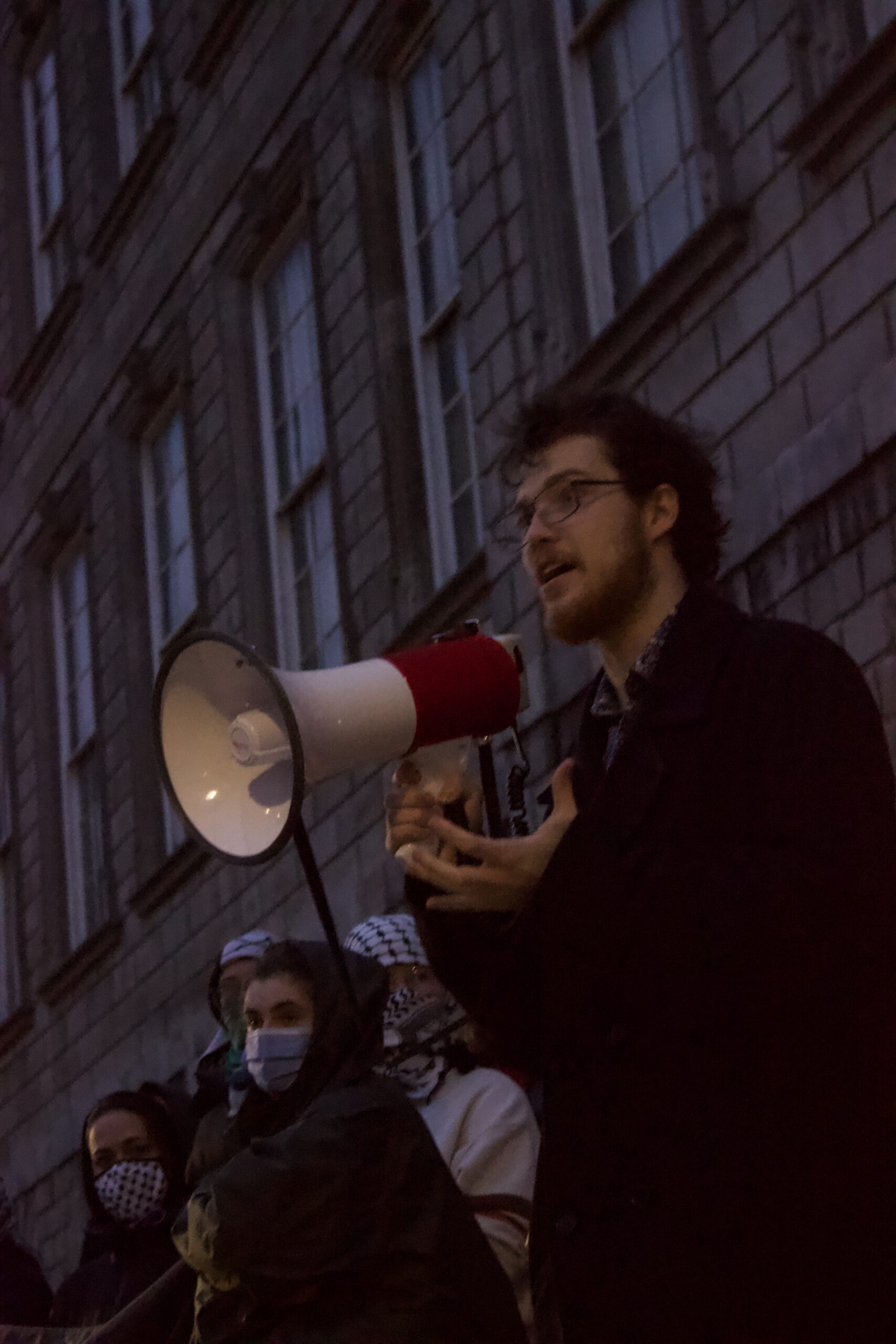The opinion piece published in this paper titled “Trinity’s Encampment was a Squandered Opportunity” in the December 2024 issue omits crucial details concerning the Free Trinity encampment and the divestment process. At the outset, it can be stated that all students and staff present voted on the May 8th university-encampment deal. Negotiators communicated precise information as to how divestment can be accomplished at Trinity within technical, legal, and logistical constraints. Strategic change-making accounts for the practicalities of the real world. There is evidence that through engagement with systems, if with a critical attitude, lasting impacts can be made.
College has divested from four of the thirteen Israeli companies in its investment fund, those within the Occupied Territories, since June 2024. As to the remaining nine outside the Occupied Territories, a public commitment was made by Trinity that it will endeavour to divest from them. It is up to Irish Life, the investment manager external to Trinity, to extend the exclusion of the Occupied Territories towards an exclusion from Israel as such in the pooled fund. This process is outside of the Trinity’s hands and will take time, but the request has been made, most indubitably.
This logistical challenge slows the prospect of immediate divestment. It arises not from delaying tactics by senior management, but simply from the fact that investment funds have hundreds of investors, making any change difficult as it is reliant on an external entity and its interaction with diverse stakeholders. This is in contrast to an in-house investment fund which would ensure direct control over financial holdings. However, most universities have shifted away from this approach because of the significant resources it requires. Therefore, it is not a viable option.
The awareness of this fact is also what led Trinity BDS to focus on Israeli companies. Hewlett-Packard and Intel feature in the same fund and are on the BDS list. Seeing that Israeli stock is an economic risk in the first place, however, the former is an easier sell than the latter to the fund managers. This strategically flexible move understands that the victory lies in hurting the social license of Israel rather than dogmatic adherence to a specific list. That being said, Trinity is currently draining its €45 million cash reserve from Barclays Bank, on the BDS list, and will phase out the use of this bank as communicated to the Students’ Union in June 2024.
Significant progress has been made with suppliers, as contracts with nine Israeli suppliers have been terminated. One Israeli supplier is remaining, however, until its expiration in March 2025 due to contractual obligations. This legal barrier makes divestment insurmountable, and is therefore an exception. Trinity cannot expose itself to such legal risks and the associated financial costs. Students are therefore accepting what can contractually be done, and taking the wins as wins. Rationality over defeatism.
As to academic ties, a process is ongoing within the task force. Currently, Trinity has direct agreements with Bar-Ilan University, and Hebrew University, facilitating student exchanges as well as six indirect collaborations under Horizon Europe for research projects. A long and drawn-out process has to be set up to transcend the limitations of so-called academic freedom, which researchers hold dear. In other words, there is a need for a process, embodied in the task force, to justify cutting ties without endangering an academics’ ongoing research, which could legally challenge the university.
In the case of the direct exchange agreements, it is hoped that these ties will be cut and future links with Israel banned. On the other hand, it is considered politically nonviable to expect academics to cease work in the middle of projects, so it is hoped that any indirect research agreements will lapse and future links will be banned. This is the likely outcome of the task force, and should not be regarded as a failure, but as a win that advances the aims of the boycott campaign.
On top of all this, the task force is necessary to make the divestment into a long-term policy. This is relevant for investments, suppliers and academic ties. Cutting these ties as a once-off must be combined with the implementation of a long-term policy ensuring that no new ties are made. The task force will ensure that the short-term changes are institutionally embedded.
Whether a task force is capable of co-opting the student movement depends on the circumstances. For example, the public pressure on the authorities in its country of location, the continuing pressure applied by protestors through the threat of renewed direct action and the strength of the Zionist pressure lobby are key factors. After comparable processes, Ghent University, Vrije Universiteit Brussel, and five universities in Norway severed ties with Israeli universities. Similarly, The Royal Academy of Art, Sciences Po Strasbourg, and the Estonian Academy of Arts broke off ties. Likewise, a 76 university-confederation in Spain, Crue Universidades Españolas (CURE), declared its intent to cut ties followed by three institutions from the group implementing the decision.
In Ireland, the University of Galway’s report on links with Israel recommends not establishing unilateral and multilateral links with Israel, supported by the use of an ethics assessment before engagement with a project. This is why critical support is the attitude with which students and staff should approach the task force.
In no uncertain terms, Trinity has divested, committed to divest, and committed to review problematic ties with Israel. This process has earned the ire of the Israeli embassy with Israeli Ambassador Dana Ehrlich branding the College as “verging on anti-semitism”. So, the pro-Palestine student movement is on the right track to achieve the ideal of College becoming an apartheid-free zone. If the institution betrays our trust, the movement must then begin ramping up pressure, and keep fighting. Previous struggles have seen compromises, backtracks, and partial successes until eventually becoming victorious, so demanding immediate rupture, rejecting half-measures, and refusing to negotiate with the authorities is a mistake if one wishes to progress the cause of Palestine.







